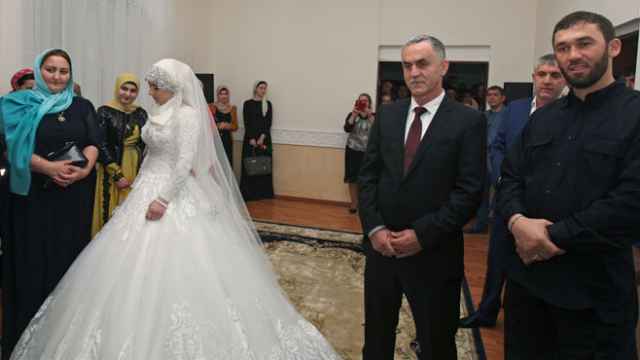Weeks after a Chechen police chief took a 17-year-old local girl as his second bride, a state-run pollster has revealed that 87 percent of Russians stand opposed to the practice of polygamy among the population as a whole.
The figure, based on a poll conducted by VTsIOM, represents a four-percentage-point increase in the portion of the Russian population that approves of polygamy since 1999, when a similar poll was conducted.
A mere 10 percent of those polled by VTsIOM in late May said they supported the idea of polygamy, a significant drop from the 18 percent who backed the practice in 1999.
Respondents were more lenient with regard to the practice of polygamy within the country's Muslim population, though those figures have plunged by more than half in the past 16 years. Thirty-three percent now support the notion of Muslims taking a second partner, compared to 70 percent in the earlier survey.
The poll results came two weeks after Chechen police chief Nazhud Guchigov took 17-year-old Kheda (Luiza) Goylabiyeva as his second wife, prompting an uproar in the Russian media.
Guchigov, reportedly in his mid-40s, married his bride at a ceremony in Grozny that was also attended by the republic's strongman leader Ramzan Kadyrov. Under Russian federal law, second marriages — which are permissible in traditional practice for Chechen men — cannot be registered as official partnerships.
Despite the story being picked up by international media outlets, the majority of those polled by VTsIOM had not heard about the marriage in Chechnya.
After being told that Goylabiyeva was Guchikov's second wife, 54 percent of respondents said their reactions to the marriage were negative or extremely negative.
The VTsIOM survey was conducted on May 22-23 among 1,600 people in 46 Russian regions. The margin of error was no greater than 3.5 percent.
Contact the author at [email protected]
A Message from The Moscow Times:
Dear readers,
We are facing unprecedented challenges. Russia's Prosecutor General's Office has designated The Moscow Times as an "undesirable" organization, criminalizing our work and putting our staff at risk of prosecution. This follows our earlier unjust labeling as a "foreign agent."
These actions are direct attempts to silence independent journalism in Russia. The authorities claim our work "discredits the decisions of the Russian leadership." We see things differently: we strive to provide accurate, unbiased reporting on Russia.
We, the journalists of The Moscow Times, refuse to be silenced. But to continue our work, we need your help.
Your support, no matter how small, makes a world of difference. If you can, please support us monthly starting from just $2. It's quick to set up, and every contribution makes a significant impact.
By supporting The Moscow Times, you're defending open, independent journalism in the face of repression. Thank you for standing with us.
Remind me later.






